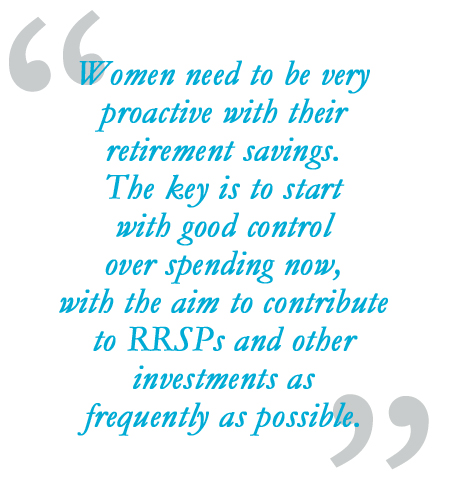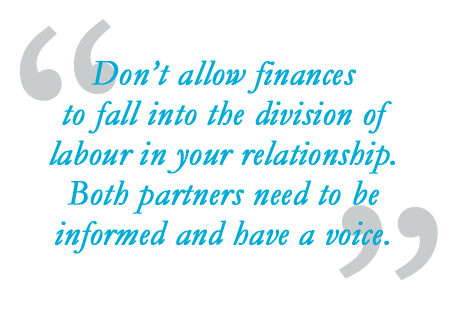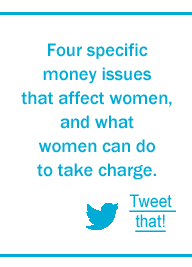By Karin Mizgala, co-founder and CEO Money Coaches Canada

Canadian women have the freedom to create wealth, and make their own financial decisions, but it hasn’t always been that way. Less than 45 years ago, women had a difficult time obtaining a credit card in their own name, without it being co-signed by a husband or father.
Women’s rights, economic and otherwise, have come a long way, but the cultural baggage of a male dominated financial system hasn’t completely left us. Many women, especially those over 40, were often raised in households where dad took the lead in family finance. The result of lingering financial gender roles is that men and women view financial planning differently. In fact, the 2014 Canadian Financial Capability Survey, (CFCS), noted that women were 12% less likely than men to consider themselves, “financially knowledgeable.” That self-perception may lead women to avoid or defer financial decisions to others; which increases their risk of being disadvantaged in retirement.
Here are four specific money issues that affect women, and what women can do to take charge of their financial future.
Life Expectancy
On average women tend to live longer than men. In 2006, 37% of women aged 65 and over lived alone, compared to 17% of senior men. This disparity broadens throughout the senior years, due to women’s longer lifespans.
 The implication for financial planning is that women will likely need to support themselves longer than men will. Additionally, advanced age often brings about the need for assisted living facilities or services, which can be costly.
The implication for financial planning is that women will likely need to support themselves longer than men will. Additionally, advanced age often brings about the need for assisted living facilities or services, which can be costly.
How to take charge: Women need to be very proactive with their retirement savings. The key is to start with good control over spending now, with the aim to contribute to RRSPs and other investments as frequently as possible. Another advantage to managing and understanding your current cash flow, is that you can more easily project what your needs will be in the future.
Pay Equity and Career Trajectory
Out of 34 countries in the Organisation for Economic Co-operation and Development (OECD), Canada had the 7th highest gender wage gap in 2014. Women working full-time in Canada earn an average of 72 cents for every dollar earned by men, a situation that adds to the challenge of investing money for the future.
Pregnancy and raising a family often results in women taking time out from their careers to work in the home, or to switch to part-time employment. Part-time jobs offer more time flexibility, but mean less paid working hours and, more often than not, lower pay. Women are also more likely to step away from full-time work to care for aging parents. All these scenarios result in years of missed earnings, slower career advancement and less pension building, than would be expected with a more linear career path.
How to take charge: While we should all advocate for closing the gender wage gap, it isn’t something we can directly influence. It’s also difficult to navigate through the career stops and starts that are a reality for many women. The important thing is to be aware and to be proactive. Getting excellent financial planning advice can make all the difference in how well you manage and invest the funds you do have during career down-times.
Relationship with Money
Both men and women have complicated relationships with money. Many women grew up in households where, even if both parents had careers, dad was the one who took care of the “serious” money tasks around investing and retirement planning. Men have been socialized for years to be in charge of the family finances, and sometimes women, with so  many other child care and home expectations on their plate, are happy to defer financial planning to the partner they love and trust. Many couples handle finances together, but even then, one or the other partner usually takes the lead, and stereotypical as it may sound, it is often the man. While I do see the younger generation women taking more control of their finances, sadly I’m still hearing from some that they’d rather get married and have someone else take care of those decisions.
many other child care and home expectations on their plate, are happy to defer financial planning to the partner they love and trust. Many couples handle finances together, but even then, one or the other partner usually takes the lead, and stereotypical as it may sound, it is often the man. While I do see the younger generation women taking more control of their finances, sadly I’m still hearing from some that they’d rather get married and have someone else take care of those decisions.
But what happens in the case of a partner’s illness or death? What if the marriage doesn’t last? Financial empowerment and stability are too important to not be fully engaged.
Another money relationship challenge for women can be triggered by a need to care and nurture through financial support. Wanting to financially help aging parents, university bound children, or even adult children, who are struggling, may seem like the loving, responsible thing to do, but it can be a problem if women fail to take care of their own financial needs first.
How to take charge: Don’t allow finances to fall into the division of labour in your relationship. Both partners need to be informed and have a voice. It’s also paramount that your financial future is secure before you help others. You aren’t helping anyone if your bills go unpaid or your retirement is in jeopardy.
Investing Intimidation
Participants of the CFCS were asked if they believe they “know enough about investments to choose ones suitable to their circumstances.” Forty-eight percent of women said yes, compared to 63% of men.
When people feel uninformed about something they are more likely to defer to those they believe have more knowledge. They may refrain from asking questions out of fear of  looking foolish. This is risky when it comes to money and investing. A financial advisor that makes money on commissions may not be using their knowledge to your advantage. It’s incredibly important that you understand what you are investing in and it’s important that your investment advisor knows what your needs are.
looking foolish. This is risky when it comes to money and investing. A financial advisor that makes money on commissions may not be using their knowledge to your advantage. It’s incredibly important that you understand what you are investing in and it’s important that your investment advisor knows what your needs are.
How to take charge: Educate yourself. You don’t need to become an expert; you just need to demystify the investment process. There are many books that will teach you the basics and jargon. It would also be beneficial to meet with a fee-for-service money coach so you can discuss your own needs and ask questions without fear of feeling foolish. At Money Coaches Canada we recently launched an Investment Coaching Program for Women, with a supportive and relaxed atmosphere. You’ll come away with the knowledge, tools and confidence to be more involved in the saving and investing decisions that concern your, and your family’s, long term financial security.
It’s your future
The reality is, as a woman you will probably live longer than men, yet you probably earn less than you deserve. You are more likely to sacrifice time from your career to raise a family or care for elderly parents. All of which impacts the financial security of your future.
Life never follows a simple path; there will always be challenges and surprises, good and bad. But you are still in charge. You can plan, you can invest and you can prosper. Here is a tool to get you started.
You don’t have to figure it out on your own. We are here to help. Share your experience, give us a call, 604-877-0977, or send me an email about your most pressing investment concerns.


